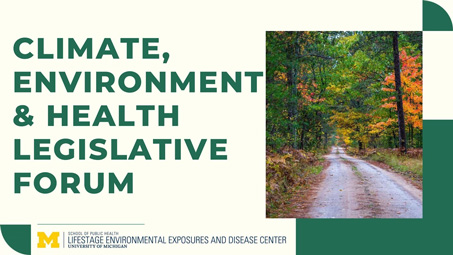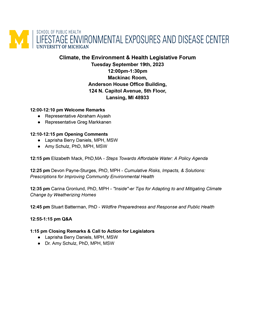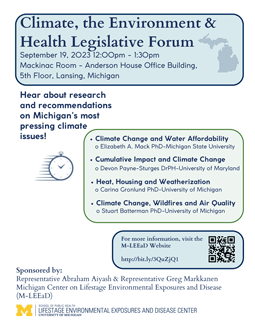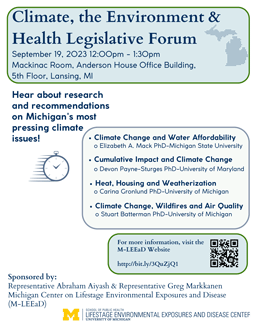Hear about research and recommendations on Michigan’s most pressing climate issues!
Speakers and Topics

“Steps Towards Affordable Water: A Policy Agenda” with Elizabeth Mack, PhD, MA
Michigan State University: Professor, Geography, Environment, and Spatial Sciences
Elizabeth Mack is a Professor in the Department of Geography, the Environment, and Spatial Sciences at Michigan State University where she teaches courses in economic geography. Dr. Mack’s research utilizes mixed methods to understand the evolution of the economy in the face of rapid technological change and climate change. Research on technological change evaluates the impact of information and communications technologies (ICTs) on the development trajectory of regional economies and everyday work. Her work on the environment and climate change evaluates household responses to changing environmental contexts, as well as uses and the ability to pay for water services. Dr. Mack’s research has been funded by a variety of agencies including the National Science Foundation (NSF), the United States Department of Agriculture (USDA), the National Aeronautics and Space Administration (NASA) and the Kauffman Foundation for Entrepreneurship Research.
Show Policy Briefs and Research Articles
- Policy Briefs
- Affordable Water for All Michiganders
- Water service affordability in Michigan: factsheet
- Water service affordability in Michigan: report
- Household Flooding in Michigan
- Research Articles
- A Burgeoning Crisis A Nationwide Assessment of the Geography of Water Affordability in the United States
- An Analysis of Household Perceptions of Water Costs across the United States_ A Survey Based Approach
- An Experiment in Making Water Affordable
- Exploring the invisible water insecurity of water utility shutoffs in Detroit, Michigan
- Water Affordability in the United States

“Cumulative Risks, Impacts, & Solutions: Prescriptions for Improving Community Environmental Health” with Devon Payne-Sturges, Dr.Ph, MPH
University of Maryland: Associate Professor, Maryland Institute for Applied Environmental Health
Dr. Devon Payne-Sturges is an Associate Professor with the Maryland Institute of Applied Environmental Health, with a joint appointment in the Department of Epidemiology and Biostatistics. She is energized by the challenge of cumulative environmental health risks and social disparities in environmental health because, says Payne-Sturges, these issues are difficult, complicated and sometimes controversial, from both science and policy perspectives. Prior to joining the faculty at the University of Maryland, Payne-Sturges served as Assistant Commissioner for Environmental Health with the Baltimore City Health Department, then later as the Assistant Center Director for Human Health with U.S. EPA’s National Center for Environmental Research, where she focused on biomonitoring for policy analysis, cumulative risk assessment, health impact assessment, environmental health indicator development, children’s environmental health and environmental health of minority populations.
Show Policy Briefs and Research Articles
- Policy Briefs
- Cumulative Impact
- Research Articles
- Defining and Intervening on Cumulative Environmental Neurodevelopmental Risks: Introducing a Complex Systems Approach
- Healthy Air, Healthy Brains: Advancing Air Pollution Policy to Protect Children’s Health
- Integrating Susceptibility into Environmental Policy: An Analysis of the National Ambient Air Quality Standard for Lead
- Mixture toxicity, cumulative risk, and environmental justice in United States federal policy, 1980–2016
- Regulate to reduce chemical mixture risk
- Understanding The Cumulative Impacts Of Inequalities In Environmental Health: Implications For Policy

“‘Inside’-er Tips for Adapting to and Mitigating Climate Change by Weatherizing Homes” with Carina J. Gronlund PhD, MPH
University of Michigan: Research Assistant Professor, Epidemiology; Research Assistant Professor, Institute for Social; Research, Survey Research Center
With Detroit community and State of Michigan government partners, she studies how social, economic, health, and built environment characteristics and air quality affect vulnerability to extreme heat, extreme precipitation, and pollen. This research will help cities understand how to adapt to heat, heat waves, higher pollen levels, and heavy rainfall in a changing climate.
Show Policy Briefs and Research Articles
- Policy Briefs
- Climate Action for Health Equity in Michigan: Updates and Suggestions for Decision Makers and Residents
- Climate Change, Extreme Heat, and Health
- Climate Change, Extreme Precipitation, and Health
- Policy Suggestions for Home Weatherization Programs
- Energy Equity in Michigan: The Issue and Action Steps for Industry and Community Members
- Research Articles
- Cascading benefits of low-income weatherization upon health and household well-being
- Energy efficiency as energy justice: addressing racial inequities through investments in people and places
- Saving lives by saving energy? Examining the health benefits of energy efficiency in multifamily buildings in the United States

“Wildfire Preparedness and Response and Public Health” with Stuart Batterman, PhD
University of Michigan: Professor of Environmental Health Sciences and Professor of Global Public Health, School of Public Health; Professor of Water Resources and Environmental Engineering, College of Engineering
Dr. Batterman's research and teaching interests address environmental impact assessment, human exposure and health risk assessment, and environmental management. His research addresses both theoretical work and applied laboratory and field studies. He is particularly interested in improving exposure measures that can be used in risk assessments and epidemiological studies; measuring toxic compounds including volatile organic compounds (VOCs) found as pollutants in drinking water, ambient and indoor air, and statistical and modeling methods that can be used to interpret and extend available measurements.
Show Policy Briefs and Research Articles
- Policy Briefs
- Ozone and Air Quality
- Wildfires
- Research Articles
- Air pollutant strategies to reduce adverse health impacts and health inequalities: a quantitative assessment for Detroit, Michigan
- Expanding number of Western US urban centers face declining summertime air quality due to enhanced wildland fire activity
- Ozone production from wildfires: A critical review
- Wildfire Fire Preparedness and Response and Public Health: Quick Facts and Policy Recommendations
- Wildfire smoke exposure under climate change: impact on respiratory health of affected communities
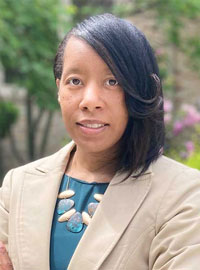
Co-Facilitator: Laprisha Berry Daniels, MPH, MSW
Detroiters Working for Environmental Justice: Executive Director
Laprisha Berry Daniels is a Public Health Social Worker who has spent the last 20 years working to reduce health disparities and improve access to clean air, water, and soil and safe, affordable housing in Detroit communities by establishing and maintaining strategic partnerships, catalyzing relevant community centered research and interventions all while amplifying the voices of the community. She currently serves as the executive director for Detroiters Working for Environmental Justice (DWEJ) where she sets the strategic direction, and establishes and maintains strategic partnerships for DWEJ.

Co-Facilitator: Amy Schulz, PhD
University of Michigan: University Diversity and Social Transformation Professor; Professor, Health Behavior and Health Education
Dr. Schulz has extensive expertise in the analysis of joint contributions of social and physical environmental conditions to racial and socioeconomic health inequities, and in the development, implementation and evaluation of policy and programmatic interventions, including conducting health impact assessments (HIAs) of proposed policies. She brings expertise in working collaboratively with community, practice and academic partners to conduct both etiologic and intervention research to understand and reduce health inequities. Her current work with the Community Action to Promote Healthy Environments (CAPHE) partnership, a CBPR partnership, focuses on air pollution, social and economic inequities in exposure and impacts, implementation of components of CAPHE's scientifically and community grounded Public Health Action Plan to reduce excess risk in the Detroit Metropolitan area. She regularly consults with community organizations and decision makers regarding the implications of administrative and policy decisions for health equity.
Sponsors
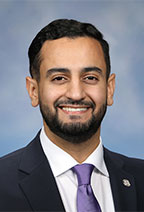
Michigan House District 9: Representative Abraham Aiyash
State Representative and Majority Floor Leader Abraham Aiyash is serving his second term in the Michigan House of Representatives. He represents House District 9, encompassing his hometown of Hamtramck and surrounding parts of Detroit, advocating for progressive solutions and justice for his community. His political activism began as a community organizer for President Obama’s historic campaign in 2008. As a young man, he found strength in mobilizing his community by amplifying a united voice against systemic problems. Recognizing the environmental injustice his community faced, Aiyash frequently organized against corporate polluters and jump-started a recycling program in his local school district. He’s realized that real power is driven by the movements started in communities and works to embody those values on the House floor. His professional career is rooted in the community efforts that developed his political interests. As a legislator, he aims to redefine the role of elected officials, as he champions solutions on the state level that address social and health disparities in poor and working class communities. He translates his community organizing experience into legislation as he works alongside community activists to ensure their voices are heard in the creation of state policies.
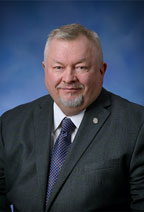
Michigan House District 110: Representative Greg Markkanen
State Rep. Gregory Markkanen was first elected to the Michigan House of Representatives in November 2018. He represents the 110th District, which includes Gogebic, Houghton, Iron, Keweenaw and Ontonagon counties, as well as Breitung Township, Sagola Township, and the cities of Iron Mountain and Kingsford, in Dickinson County. Committees: Greg serves as Republican vice-chair on the House Committee on Military, Veterans, and Homeland Security. He also serves as a member on the Insurance and Financial Services (DIFS), Tax Policy, and Education committees. Education: Greg graduated from Northern Michigan University with a degree in history and political science. Greg also graduated from Michigan Technological University Cum Laude with a social sciences and biology degree. He also has graduate work in special education with a focus on Learning Disabilities in K-12. He holds a Professional Teaching Certificate from the State of Michigan. Professional: Greg served as a medical Corpsman with the 82nd Airborne Division in the Airborne Infantry Platoon and spent additional time as a Medic with the 107th Engineer Battalion of the Michigan Army National Guard. He teaches high school civics, history and geography for Baraga Area Schools and served on the Hancock City Council as the Ward II representative. Personal: He is married to his lovely wife, Jane with two children, Kalle and Maija. They reside in Hancock.
M-LEEaD: Michigan Center on Lifestage Environmental Exposures and Disease
Michigan Center on Lifestage Environmental Exposures and Disease (M-LEEaD) is a National Institute of Environmental Health Sciences Core Center. M-LEEaD improves our understanding of the contribution of environmental exposures toward the etiology of chronic diseases and conditions like asthma, neurodegenerative diseases, metabolic syndrome and prematurity. The M-LEEaD Center supports research in environmental health sciences with three Facility Cores: Integrated Health Sciences Core (IHSC), Exposure Assessment Core (EAC) and Omics and Bioinformatics Core (OBIC).
Location
Mackinac Room, Anderson House Office Building, 5th Floor, Lansing

